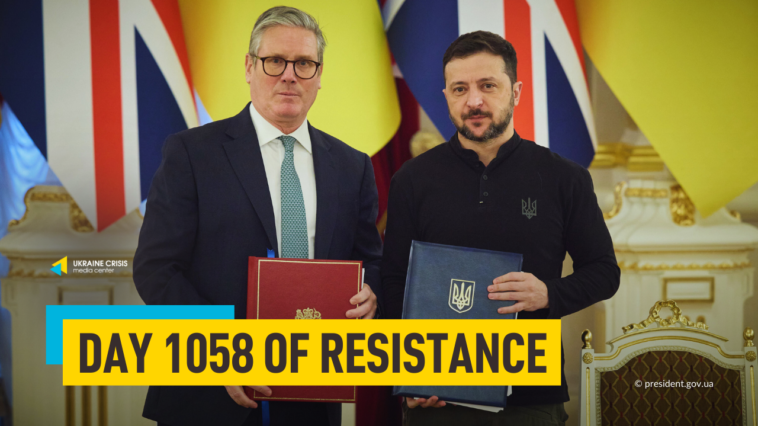The UK and Ukraine sign a landmark 100-year partnership agreement. Ukraine strikes an oil depot in Russia’s Voronezh region. U.S. oil sanctions on Russia hit its shadow fleet.
UK, Ukraine sign landmark 100-year partnership agreement
Ukrainian President Volodymyr Zelenskyi and British Prime Minister Keir Starmer signed a historic 100-year partnership agreement in Kyiv on Thursday.
“Today is a truly historic day: the relationship between Ukraine and the UK is closer than ever,” Zelenskyi told reporters after the signing. “We have reached a new level — this is more than a strategic relationship. We have signed a 100-year partnership pact,” he continued.
The treaty is expected to bolster military ties between the countries, among other areas of cooperation. The deal covers areas including defense, science, energy and trade. It builds on UK’s earlier commitment for three billion pounds in military aid for Ukraine until as long as it takes.
On January 12, 2024, Zelenskyi and then UK Prime Minister Rishi Sunak signed a 10-year agreement on security cooperation between the countries. Zelenskyi said that the accord would last 10 years and can be extended, remaining in effect until Ukraine joins NATO.
Keir Starmer arrived on his first trip as prime minister to Ukraine on Thursday. A Russian drone was flying over the Mariyinskyi Palace in central Kyiv while the two leaders were in the middle of talks. Anti-aircraft fire erupted as the drone buzzed overhead, Luke Harding writing for the Guardian, said. Loud booms were heard as Ukrainian air defenses tried to shoot it down.
After the talks with Zelenskyi, Starmer announced the UK will be sending 150 artillery barrels and a new air mobile defense system to Ukraine. “We’re going further to support the front line providing a 2.2 billion pound loan which will be paid back not by Ukraine but from the interest on frozen Russian assets,” Starmer told a news conference in Kyiv.
Ukraine strikes oil depot in Russia’s Voronezh region
Ukraine’s military said it had hit an oil depot in the city of Liski, in Russia’s Voronezh region overnight on Thursday.
“At least three drones hit the target. A large-scale fire broke out at the facility,” the General Staff of the Armed Forces of Ukraine said in a statement.
At the base were stored fuel products which were supplied for the needs of the Russian army, it added. The facility is owned by Rosneft company.
The operation was carried out by Ukraine’s Special Operations Forces in cooperation with other branches of the military.
Several oil tanks were still burning on Thursday afternoon, the Special Operations Forces said.
The governor of the Voronezh region, Aleksandr Gusev, said on Wednesday evening that debris from falling drones had caused a fire at an oil depot.
U.S. oil sanctions on Russia hit its shadow fleet
Last week, the U.S. imposed new sanctions designed to disable much of Russia’s “shadow fleet,” oil-carrying vessels that seek to avoid the restrictions.
The cost of shipping Russian Eastern Siberia–Pacific Ocean (ESPO) crude to China has more than tripled after the US imposed aggressive sanctions on Moscow’s oil industry last week, with rates expected to climb even higher, according to traders, said Bloomberg. The paragraphs below are quoted from the article.
Freight rates to transport ESPO oil from Kozmino port on Russia’s east coast to China jumped to between $5 million and $5.5 million on Monday, compared with $1.5 million prior to the sanctions, said traders familiar with route, who asked not to be identified because the matter is sensitive.
The US broadened its sanctions on tankers, targeted two Russian companies that handle more than a quarter of the OPEC+ producer’s seaborne exports, as well as insurers and traders. The blacklisted vessel fleet moved around 22% of crude shipped by sea in 2024, according to the International Energy Agency.
There’s been an immediate impact from the sanctions, with vessels carrying cargoes of ESPO and another Russian grade — Sokol — idling off the Chinese coast, according to ship-tracking data. ESPO has been a favorite of China’s refiners due to its short shipping distance.
The majority of tankers that travel the route between Kozmino and China are Aframaxes, which have the capacity to carry 750,000 barrels.
Even prior to the latest US penalties, ports in Shandong province were wary of handling sanctioned tankers following a warning from a major terminal operator. Shandong is home to most of China’s independent refiners.




